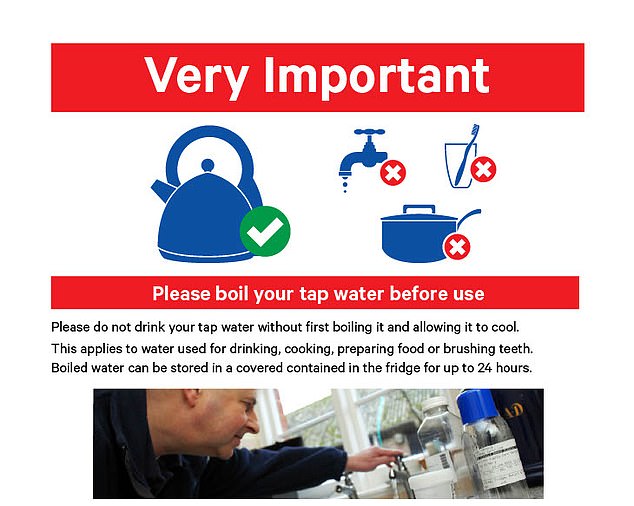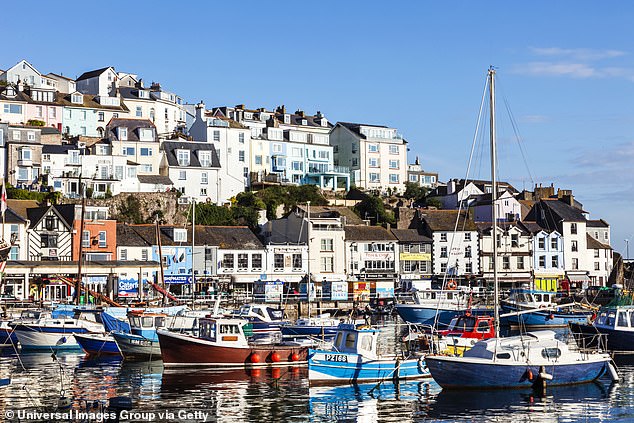As cryptosporidium victims in Devon reach 100, residents say the water is STILL too contaminated with faeces to drink… and are being offered £50 each ‘for the inconvenience’ by the utility company
One hundred people have now been affected by cryptosporidium in Devon, health officials have warned.
The ongoing outbreak of the parasite in Brixham is believed to be linked to water contaminated with infected faeces entering the drinking water supply.
Entire city streets have been infected, with victims enduring days of diarrhea and painful stomach cramps, with one patient even likening this to ‘childbirth’.
Residents have also been forced to boil their own water since May 15 to ensure it is safe to drink. South West Water (SWW) bosses said ‘further intensive work’ was still needed to ‘completely remove any contamination’.
The company said it would automatically credit customers’ accounts with £50 to compensate for any further inconvenience.
The ongoing outbreak of the parasite in Brixham is believed to be linked to water contaminated with infected faeces entering the drinking water supply. Entire city streets have been infected, with victims enduring days of diarrhea and painful stomach cramps, with one patient even likening this to ‘childbirth’. Locals in Brixham, Boohay, Kingswear, Roseland and north-east Paignton in Devon were all told to boil water as a precaution

South West Water apologized to customers and gave them detailed advice on how to remove disease-causing organisms from their water

The latest figures from the UK Health Security Agency (UKHSA) show that a further 23 cases of cryptosporidium were recorded in the Brixham area (pictured) on May 30, bringing the total number of confirmed cases to 100.
David Harris, the incident director at SWW, said that over the past week the reservoirs in Brixham have been cleaned and the network has been flushed ‘several times’.
A boil water notice still remains in effect in parts of the city and Mr Harris said the company must be “absolutely confident that we have resolved this issue” before the notice is lifted.
The latest figures from the UK Health Security Agency (UKHSA) show that a further 23 cases of cryptosporidium had been recorded in the Brixham area as of May 30, bringing the total number of confirmed cases to 100.
A damaged air valve on private property is believed to have been the source of the outbreak, potentially allowing “animal waste or contaminated groundwater to enter the local supply.”
Sarah Bird, a health protection consultant at UKHSA South West, said: ‘The data shows that the outbreak is linked to people who live in or visited Brixham’s boil water warning area and nearby areas before the warning was introduced.
“Although more cases may be reported due to the time lag between exposure and becoming ill, the number of reported cases is decreasing.
‘As with any other disease infection, it is very important to follow good infection prevention measures, such as washing hands with hot soapy water, as alcohol hand rub is not sufficient to kill cryptosporidium.
‘This will prevent further cases from spreading from person to person through the community.’
Doctors technically call a cryptosporidium infection cryptosporidiosis.
Patients often have to tolerate these symptoms for two weeks before they finally disappear from their system.
But some patients may experience longer periods of illness in people with weakened immune systems, such as cancer patients.
Victims may also experience periods of false hope where their symptoms disappear for a few days, leading them to think they have finally gotten over the infection, only for it to return.
Most people with cryptosporidiosis are not offered treatment and are instead told to drink plenty of fluids and minimize contact with other people while waiting for the symptoms to pass.
People are usually infected through contact with feces containing the parasite, either human or animal, which then enters their mouths.
The risk of water supplies becoming contaminated is also greater after periods of heavy rainfall and when animals are giving birth, such as during lambing season.
In the past two months, at least two petting zoos, which invite families to cuddle farm animals, have also been hit by suspected cryptosporidium outbreaks
More than 80 people are understood to have sought legal advice after parents and children fell ill at Gannow Farm, in Worcestershire, over Easter.
Victims of the infection suffered from serious stomach ailments, with some even requiring hospital treatment.
The UKHSA also warned earlier this month about the risk of cryptosporidium infection from farm visits.
In a twist on the classic nursery rhyme, the agency wrote on social media: ‘Mary had a little lamb, its fleece was white as snow.
“But wash your hands and dry them too in case there are any cryptocurrencies in them.”
Patients with the infection are told to stay away from work and school until they are symptom-free for at least two days, to avoid passing the bug to others.
It comes as an urgent ‘do not drink’ warning was issued to more than 600 homes in a Surrey village yesterday, following concerns over tap water testing.
A total of 616 homes in Bramley, south of Guildford, have been told their water is currently unsafe to drink following the discovery of hydrocarbons – a chemical compound that forms the basis of crude oil, natural gas and coal.
Households have been warned not to drink the tap water or use it for cooking or brushing their teeth, but they can continue to use the water for showering and washing their hands.
